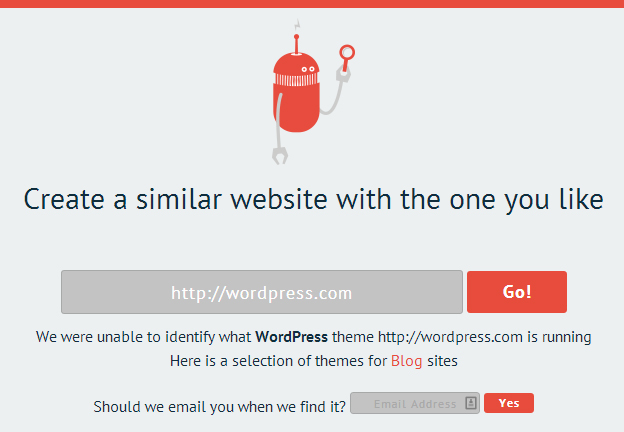In an era where many website designs are powered by popular themes, it’s become common for folks passing by to want to snoop under the hood to find out which theme a site is using. If the visitor is not capable of inspecting the code with his browser, he might resort to a service built to automatically detect theme details. This has resulted in a proliferation of websites and browser add-ons that detect this information.
What Theme is a new service that detects WordPress, Ghost and Shopify templates, even if the site is not using a commercial theme. For example, if you search WP Tavern, you’ll find that our site is using the Stargazer theme:
It does not yet reliably pick up on WordPress child themes, as I’ve discovered in this instance and a few others.
How What Theme Works
The engine itself is built on top of WordPress and in just a few weeks it has completed over 13,000 searches across over 4,000 unique sites. What Theme co-founder Jonny Schnittger gave us the details on how it works. “The current version of WhatTheme integrates with WordPress like a theme or plug-in would,” he said. “It gives us a lot of detail regarding what people are looking for and how successful they were.”
When a user searches for a site, What Theme checks its existing catalog and if it finds it, the results are returned instantly. “In this scenario we attempt to identify the theme using several different methods,” Schnittger said. “At this point we also gather a bunch of other information that we are currently not surfacing/using).” Once the engine has found the name, it attempts to identify across various catalogs and sites. “Sometimes we get multiple matches,” he said. “In this case we try and evaluate the best match and direct the user to it.”
When What Theme fails to identify a theme, Schnittger said they use various pattern matching algorithms to suggest themes from the same category, such as blog, portfolio, food, etc.
For example, if you search for “WordPress.com,” the engine fails to match it to a theme:
As you can see, What Theme also offers an option for the visitor to sign up to be emailed when the theme is found. It also funnels you to its top selections for themes in the “blog” category, all of which are Themeforest items with the What Theme affiliate ID. In the future, Schnittger hopes to expand the suggestions, based on fonts, colors and layout.
What Theme Plans to Expand to a WordPress Installation and Customization Service
What Theme currently has basic support for Drupal and Joomla and plans to expand to include more CMS’s, such as ModX, DotNetNuke, Umbraco, etc. They are working to improve the accuracy of results for all supported platforms.
Co-founder Catalin Zorzini let us in on some of their long-term goals. “We plan to become the go-to resource for web designers and developers being asked by friends and relatives to build a website for them on the cheap or for free,” he said. “So instead of being forced to say no or to make empty promises, now they can just send them to whattheme.com and we’ll take care of the rest.” What Theme will then ask them what site they would like theirs to look like and recommend an existing template based on that. “The next step is to integrate it with a WP install and customization service,” Zorzini said.
The What Theme site is another interesting take on services aimed at capitalizing on the millions of people searching for WordPress themes. Many services, such as Theme Friendly, are built around helping users shop for WordPress themes, with the primary monetization in the form of affiliate links.
What Theme is different in that it hooks into the fact that the consumer has already located a theme that he likes. The long-term strategy for building a customization service as an offshoot of the theme search seems to be more promising than depending on affiliate links for income. What do you think about the What Theme search engine? Will they be able to leverage the traffic into a successful WordPress business?


Cool product! But it currently doesn’t detect parent themes when a site is running a child theme. That should be as easy as reading “Template: [ ___ ]” in the child theme’s style.css–hope they implement that soon.